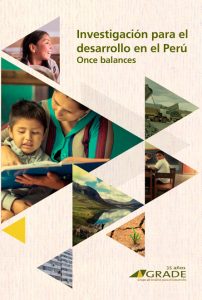Algunas reflexiones sobre los programas alimentarios y nutricionales: cambios y retos durante la última década
Investigación para el desarrollo en el Perú: once balances
| Year | : | 2016 |
|---|---|---|
| Author/s | : | Lorena Alcazar |
| Area/s | : | Methodologies for research and evaluation of policy and programmes, Health and nutrition |
Alcázar, Lorena (2016). Algunas reflexiones sobre los programas alimentarios y nutricionales: cambios y retos en la última década. En GRADE. Investigación para el desarrollo en el Perú: once balances. Lima: GRADE.
This article analyzes the state of nutritional and food social programs in Peru in light of what has been learned and observed over the past decade, and identifies the main challenges they still face. It follows from the study “Why do food and nutritional programs not work?” (Alcazar 2007), reviewing how these programs have changed and how effective the changes have been. We found many improvements, but they are still insufficient for combating infant malnutrition and anemia. Progress has been observed in the coordination of these programs, in part due to the creation of the Ministry of Development and Social Inclusion. While not much has changed in relation to welfare food programs, in terms of school food programs, the creation of Qali Warma improved procedures and other aspects such as the quality of the rations distributed. However, it still faces big challenges, mainly to improve service and serve more rural and remote areas. Also, this program represents an enormous portion of the social budget of the country, but expectations in terms of its impact on child development are not clear.
At the same time, cross-sector coordination for combating infant malnutrition has been reinforced, as interventions are prioritized according to results, and investment in infrastructure, health controls, and vaccines has increased; however, key challenges persist, such as sufficient and adequate provision of nutritional supplements, improvement and expansion of health services, and enhancement of nutrition education. Another general key challenge is how to adapt the interventions effectively and in a coordinated way to better serve the country’s different regions and social situations.







